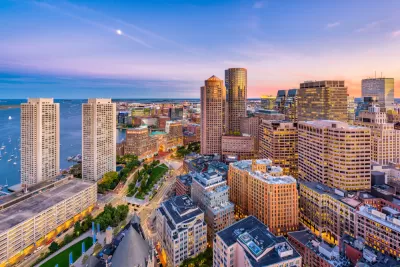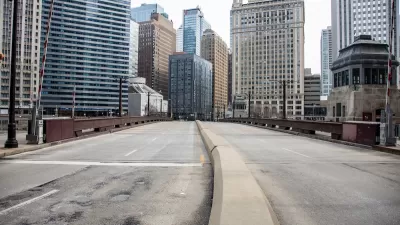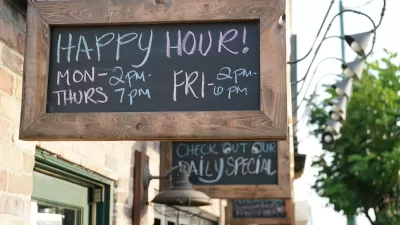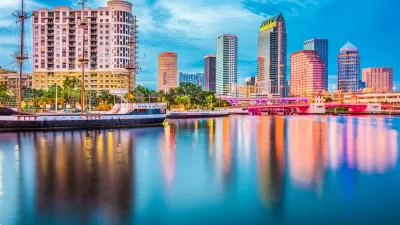A new report suggests that despite recent challenges, the ‘value proposition’ of urban activity centers remains as strong as ever.

An analysis from the Bass Center for Transformative Placemaking presents evidence in favor of the argument that, despite pre-pandemic growth in suburban job centers and the pandemic-induced clearing out of central business districts, “cities’ value proposition is still very much intact.”
Tracy Hadden Loh and Jennifer S. Vey outline the results of the report for Bloomberg CityLab, writing that “these findings can inform city leaders on how workplace needs might continue to evolve — and how they can deploy policy and funding to shape a more resilient economic future.”
Presenting their evidence, Loh and Vey note that “In our model, every increase in median activity center job density of 1,000 jobs per square mile is worth an additional $1,723 in output per worker across the metro area.”
While correlation is not causation, this suggestive relationship between place and productivity is important for employers and workers to consider as they make decisions about where to locate — and for urban leaders to recognize as they work to sway those choices in their favor.
According to Loh and Vey, “There is substantial measurable value to employers and the economy when firms locate their workers in close proximity not just to their colleagues, but to workers from other firms and sectors.”
The authors describe steps cities can take to keep downtowns vibrant, such as ensuring frequent and reliable transit services to reduce the cost and time spent commuting, concentrating housing near job centers, and investing in inviting, safe, accessible public spaces that make people want to spend time in cities.
FULL STORY: The Productive Power of Urban ‘Activity Centers’

Maui's Vacation Rental Debate Turns Ugly
Verbal attacks, misinformation campaigns and fistfights plague a high-stakes debate to convert thousands of vacation rentals into long-term housing.

Planetizen Federal Action Tracker
A weekly monitor of how Trump’s orders and actions are impacting planners and planning in America.

In Urban Planning, AI Prompting Could be the New Design Thinking
Creativity has long been key to great urban design. What if we see AI as our new creative partner?

Pedestrian Deaths Drop, Remain Twice as High as in 2009
Fatalities declined by 4 percent in 2024, but the U.S. is still nowhere close to ‘Vision Zero.’

King County Supportive Housing Program Offers Hope for Unhoused Residents
The county is taking a ‘Housing First’ approach that prioritizes getting people into housing, then offering wraparound supportive services.

Researchers Use AI to Get Clearer Picture of US Housing
Analysts are using artificial intelligence to supercharge their research by allowing them to comb through data faster. Though these AI tools can be error prone, they save time and housing researchers are optimistic about the future.
Urban Design for Planners 1: Software Tools
This six-course series explores essential urban design concepts using open source software and equips planners with the tools they need to participate fully in the urban design process.
Planning for Universal Design
Learn the tools for implementing Universal Design in planning regulations.
planning NEXT
Appalachian Highlands Housing Partners
Mpact (founded as Rail~Volution)
City of Camden Redevelopment Agency
City of Astoria
City of Portland
City of Laramie





























